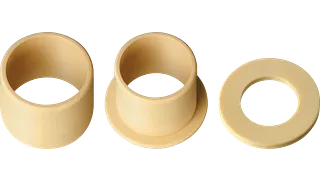Change Language :
iglidur® W300 - Material data
The most important specifications at a glance
Temperatures
iglidur W300 bearings retain their exceptional abrasion resistance even up to the highest permissible application temperatures and at the same time do not tend to become brittle at low temperatures. Additional protection is required for temperatures above +60°C.
Temperatures, coefficient of thermal expansion
| min. application temperature | Upper application temperature, long-term | Upper application temperature, short-term | In addition secure axially from |
|---|---|---|---|
| -40°C | +90°C | +180°C | +60°C |
Permissible surface speeds
Even at higher surface speeds, the coefficient of friction of iglidur W300 plain bearing does not increase. Slightly higher surface speeds can therefore be achieved compared to other materials, e.g. up to 1.5m/s rotating and up to 6.0m/s linear. Due to the exceptional wear resistance, bearing wear remains low even during prolonged use at high speeds. Very high speeds can be achieved with iglidur W300 bearings on hardened, not too smooth shafts.
Surface speeds of various iglidur materials
| Maximum surface speed [m/s] | Rotating | Oscillating | linear |
|---|---|---|---|
| permanent | 1.0 | 0.7 | 4.0 |
| Short-term | 1.5 | 1.8 | 6.0 |
Permissible pv values
Mechanical specifications
The compressive strength of iglidur W300 plain bearing decreases with increasing temperatures. Diagram 02 illustrates this relationship. The maximum recommended surface pressure represents a mechanical material parameter. Conclusions about the tribology cannot be drawn from this. Despite its high flexibility, iglidur W300 has a very high compressive strength. Diagram 03 shows the elastic deformation of iglidur W300 under radial load. Under the maximum recommended surface pressure of 60MPa, the deformation is less than 3%.
Friction and wear
Like the wear resistance, the coefficient of friction μ also changes with the load. Unlike the other iglidur materials, the coefficient of friction of iglidur W300 remains constantly low even at higher peripheral speeds.
Coefficient of friction against steel (Ra = 1μm, 50HRC):
| iglidur W300 | dry | Greases | Oil | Water |
|---|---|---|---|---|
| Coefficient of friction µ | 0.08 - 0.23 | 0.09 | 0.04 | 0.04 |
Shaft materials
Friction and wear are also highly dependent on the mating partner. Shafts that are too smooth increase both the coefficient of friction and the wear of the bearing. Smooth shafts harbour the risk of stick-slip. Squeaking as an effect of stick-slip is usually the result of shafts that are too smooth. Shaft roughness of 0.4 to 0.5μm has proven to be the best. Especially with iglidur W300, the wear resistance with this surface finish is still very good, while the friction assumes the lowest value. Diagram 06 shows an extension of the results of tests with different shaft materials. Hardened shafts are preferable, especially for higher loads. If your intended shaft material is not included in the test results presented here, please contact us.
Moisture absorption
The moisture absorption of iglidur W300 plain bearing in a normal climate is around 1.3% weight. The saturation limit in water is 6.5% weight. This must be taken into account under appropriate operating conditions.
Weathering resistance
iglidur W300 plain bearings have limited resistance to weathering. The material properties deteriorate. Discolouration occurs. Practical tests under real application conditions are recommended.
Chemical resistance
iglidur W300 plain bearings have good resistance to chemicals. They are resistant to most lubricants. Most weak organic and inorganic acids do not affect iglidur W300.
+ resistant 0 conditionally resistant - non-resistant
All data at room temperature [+20 °C]
| Medium | Resistance |
|---|---|
| Alcohols | + up to 0 |
| Hydrocarbons | + |
| Greases, oils without additives | + |
| Fuels | + |
| Diluted acids | 0 to - |
| Strong acids | - |
| Diluted alkalines | + |
| Strong alkalines | 0 |
Installation tolerances
iglidur W300 plain bearings are standard bearings for shafts with h-tolerance (recommended minimum h9). The bearings are designed for press-fit into a housing machined to H7 tolerance. After installation in a housing with nominal dimensions, the inner diameter of the bearings with E10 tolerance adjusts automatically. For certain dimensions, the tolerance deviates from this depending on the wall thickness (see product range).
Important tolerances according to ISO 3547-1 after press-fit:
| Diameter d1 [mm] | Shaft h9 [mm] | iglidur W300 E10 [mm] | Housing H7 [mm] |
|---|---|---|---|
| up to 3 | 0 - 0.025 | +0.014 +0.054 | 0 +0.010 |
| > 3 up to 6 | 0 - 0.030 | +0.020 +0.068 | 0 +0.012 |
| > 6 up to 10 | 0 - 0.036 | +0.025 +0.083 | 0 +0.015 |
| > 10 up to 18 | 0 - 0.043 | +0.032 +0.102 | 0 +0.018 |
| > 18 up to 30 | 0 - 0.052 | +0.040 +0.124 | 0 +0.021 |
| > 30 up to 50 | 0 - 0.062 | +0.050 +0.150 | 0 +0.025 |
| >50 to 80 | 0 - 0.074 | +0.060 +0.180 | 0 +0.030 |
| >80 to 120 | 0 - 0.087 | +0.072 +0.212 | 0 +0.035 |
| >120 to 180 | 0 - 0.100 | +0.085 +0.245 | 0 +0.040 |
Electrical specifications
Plain bearings made of iglidur W300 are electrically insulating.
| Specific transitional resistance | Surface resistance |
|---|---|
| > 1013 Ωcm | > 1012 Ω |
Additional properties

Buy iglidur W300 products in the online shop
- Large selection of moulds and materials
- Available within 24 hours
- No minimum order value
- No minimum order quantity
Typical application areas
Consulting
I look forward to answering your questions

Shipping and consultation
In person
Monday to Friday: 8 am – 8 pm
Saturday: 8 am – 12 pm
Chat-Service
Monday to Friday: 8 am – 5 pm
WhatsApp-Service
Monday to Friday: 8 am – 5 pm











